Business Process Management (BPM) Software is an essential tool designed to streamline and improve the efficiency of your company’s operations. The software integrates various tasks and workflows into a cohesive system, automating routine processes to reduce errors and increase productivity.
However, without the right BPM software, businesses may face disorganised processes and inefficiencies, wasting time and resources. Lack of real-time monitoring makes it hard to track performance and fix issues quickly, leading to poor visibility and decisions. This can result in ineffective strategies and planning.
In Malaysia, implementing BPM software has proven beneficial for many companies. According to a study by TechNavio, businesses that adopted BPM solutions saw a 20% increase in operational efficiency and a 15% reduction in process costs over 12 months.
With BPM capabilities being a solution for businesses in Malaysia, are you already using the right BPM software for your company? If not, read this article to learn more about the 12 best Business Process Management Software in Malaysia and find the best solution to optimise your operations.
Table of Content
Content Lists

Key Takeaways
|
What is Business Process Management Software?
Business Process Management (BPM) Software optimizes company operations by automating and streamlining tasks, enhancing efficiency, and reducing errors. One example is ERP software, which not only manages business processes but also integrates various operational functions into a single platform.
These tools do more than automate processes; they align workflows with business goals, promoting seamless coordination across departments. Adopting BPM software means investing in a solution that will significantly improve operational efficiency and help you achieve your strategic objectives more effectively.
Here are five main ERP benefits that positively impact a company and address existing obstacles:
- Streamlined operations and efficiency gains: BPM software automates tasks and optimizes workflows, boosting efficiency and reducing manual errors.
- Enhanced process visibility and control: It provides real-time insights and performance reports, helping to identify and address bottlenecks effectively.
- Improved compliance and risk management: BPM software ensures consistent process adherence and accurate documentation, aiding regulatory compliance.
- Increased flexibility and agility: It allows quick adaptation to changes and implementation of new strategies, enhancing business responsiveness.
- Enhanced customer experience and satisfaction: By improving process efficiency, BPM software enables faster, more accurate service, leading to higher customer satisfaction.
Types of Business Process Management
Business Process Management (BPM) is key to improving company workflow. It’s important to know about BPM software types to pick the right one for your business. We’ll look at three main BPM types: human-centric BPM, Document-centric BPM, and Integration-centric BPM.
- Human-centric BPM focuses on tasks requiring human judgment and decision-making, such as approvals and customer support. This type of BPM software is flexible and practical for managing complex processes that involve access control and employee tasks, like customer service or onboarding.
- Document-Centric BPM specializes in handling and organizing documents efficiently. It automates document creation from multiple inputs, ensuring accurate and accessible records. Typical applications include managing legal documents and contracts.
- Integration-Centric BPM is designed for seamless collaboration between different systems. It integrates various software tools to facilitate smooth data sharing and reduce manual data entry, improving workflow efficiency. For instance, it helps transfer marketing data to sales CRM software.
Choosing the right BPM software for your business can make things run smoother, work better, and help your company grow. Knowing about Human-centric BPM, Document-centric BPM, and Integration-centric BPM enables you to make intelligent choices that meet your business needs.
12 Best Business Process Management Software in Malaysia
Before diving into our list of the 12 Best Business Process Management Software in Malaysia, it’s essential to understand why selecting the right BPM software is crucial for your business. By choosing the right solution, you position your company for improved workflow management and better decision-making.
Below are 12 Business Process Management Software for Malaysian Companies, each offering unique features to elevate your business processes and drive success.
1. Business Process Management Software HashMicro
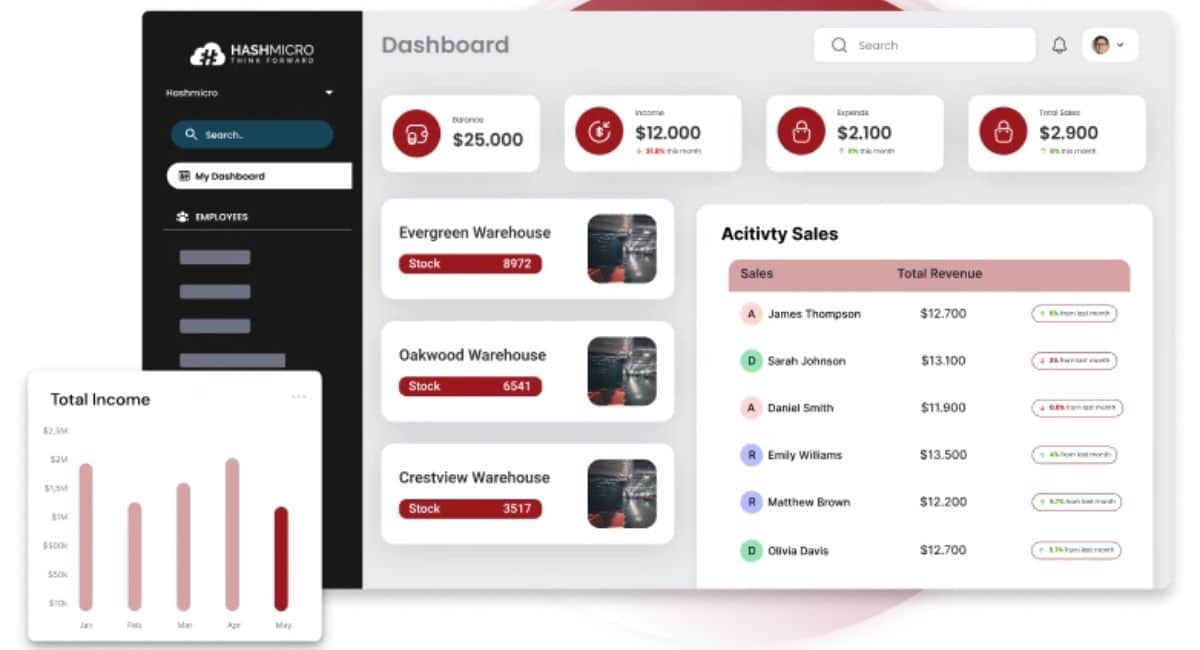
HashMicro is a leading provider of cloud-based ERP software solutions in Southeast Asia. HashMicro software can help companies of all sizes to simplify business processes, including end-to-end business process management. HashMicro software is known for its flexibility and system capabilities powered by AI (Artificial Intelligence) technology, making it an excellent choice for companies in various industries.
If you are interested in finding out more about HashMicro’s business process management software, you can start considering a free demo to find out if this vendor is the right choice for your business management.
In addition to providing business process management solutions, HashMicro offers a variety of end-to-end solutions, ranging from customer management to production, inventory, and finance. This integration capability allows you to collect data better and achieve maximum ROI.
HashMicro’s ERP Software also has the advantage of feature customization that can be tailored to the specific needs of your business. The following are various excellent features of business process management software that can support your business efficiency:
The following are some of the excellent features offered by HashMicro to support the efficiency of your business management process:
- Built-in Business Intelligence: This feature helps you see trends, comparisons, and patterns in large data sets in a simple and intuitive way.
- End-to-end Budgeting: This feature allows you to manage every part of your budget from start to finish, including planning, execution, and tracking.
- Sales Forecasting: This feature uses past sales data to predict future sales trends, helping you make better business decisions.
- WhatsApp Integration: Using this feature, you can communicate and receive updates through WhatsApp directly within the software.
- Mobile App: This feature lets you manage business tasks and access information from anywhere using a dedicated phone app.
- AI-Generated Report & Explainer: This feature allows the software to create easy-to-understand reports, suggest actions to take, detect unusual costs, and act as a virtual assistant.
- Sheet Management: This feature efficiently handles, automates, and analyzes spreadsheets and business documents, ensuring data security and module integration.
- Key Performance Indicators (KPI) Scorecard: Using this feature, you can track important performance metrics, aiding decision-making and company strategy.
Strengths:
- Unlimited user
- User-friendly interface
- Web-based software for easy access anywhere
- Customizable based on business needs
- Dedicated customer support
- Seamless integration with other systems
Weaknesses:
- Implementation duration varies due to feature adjustments to business needs.
After learning about the various advantages offered by HashMicro, you can start calculating the price scheme to see how HashMicro software can really improve your management efficiency. Click the banner below to get a price calculation!
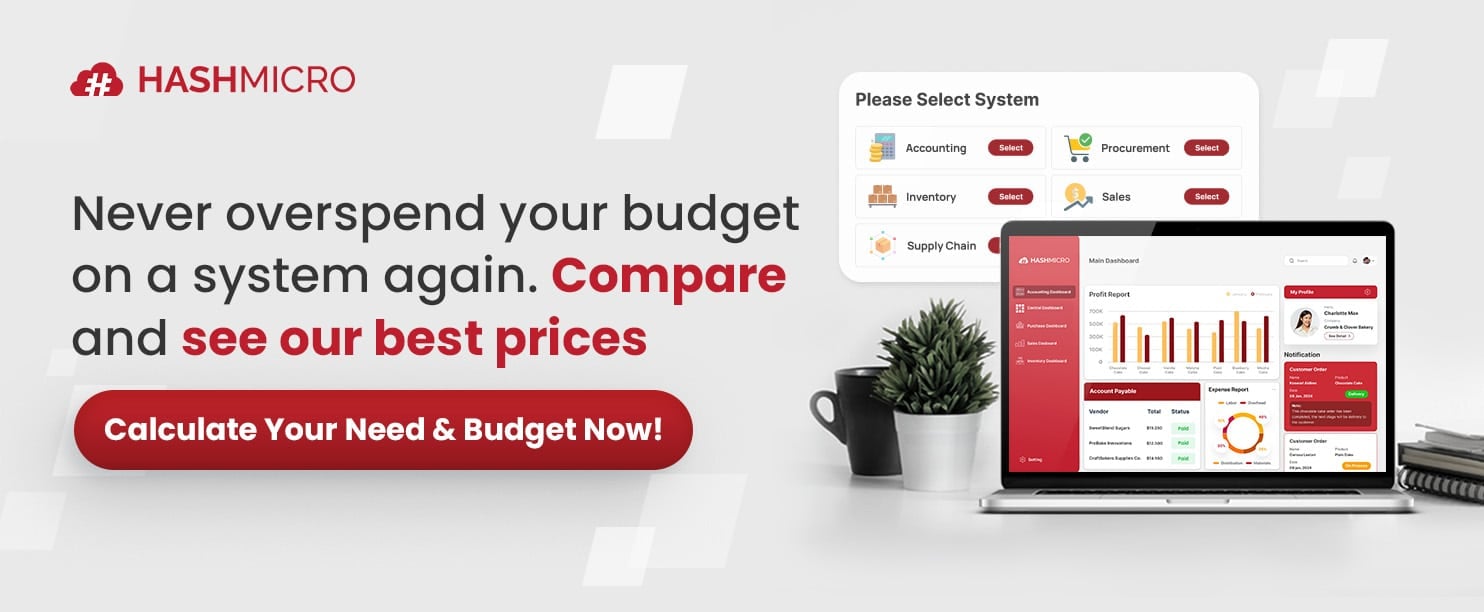
2. Oracle BPM Software
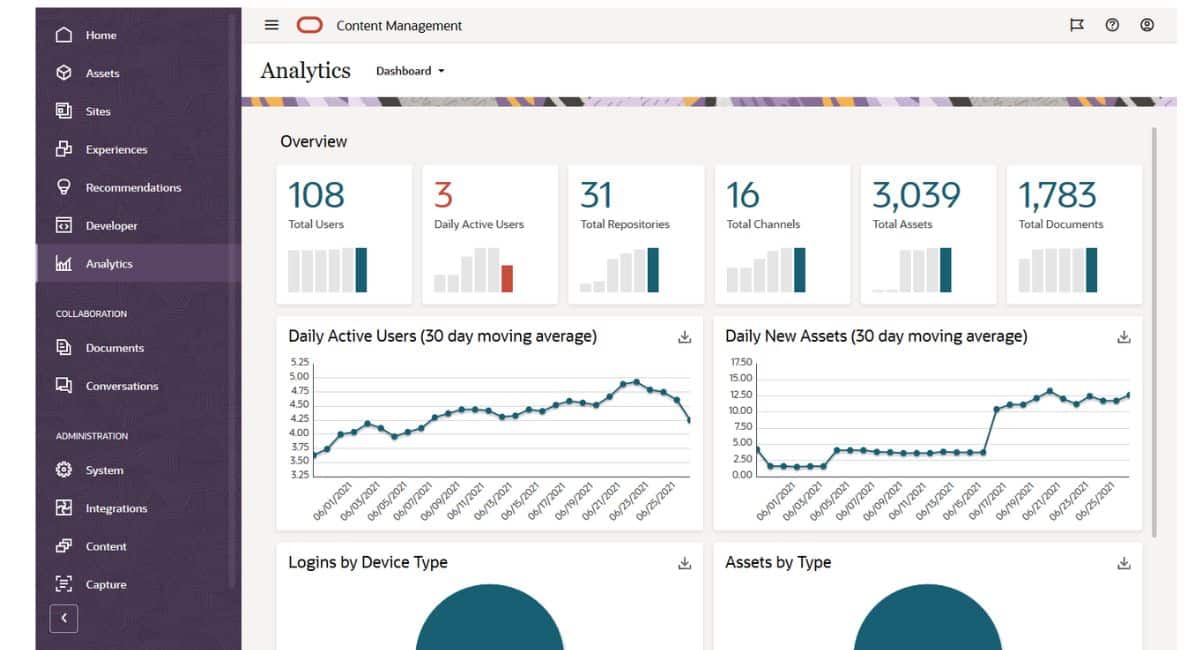
Oracle Corporation, a global technology leader from the United States, offers a comprehensive BPM Suite designed for large enterprises. Oracle’s solution excels in process modeling, automation, and analytics, enabling organizations to boost operational efficiency and drive innovation. With its advanced capabilities, Oracle helps businesses manage complex processes seamlessly.
Key features of Oracle:
- Activity Tracking
- Collaboration Tools
- Monitoring
- Process Modeling & Designing
- Reporting/Analytics
Strengths:
- Seamlessly integrates with other Oracle products and various third-party applications.
- Advanced analytics for in-depth performance insights.
- Features that fulfill business needs
Weaknesses:
- The software can be complex to implement and use, requiring specialised training.
- High licensing and maintenance costs
- Difficult to set up and run. You have to install and set up several server-side components.
3. Monday.com BPM Software
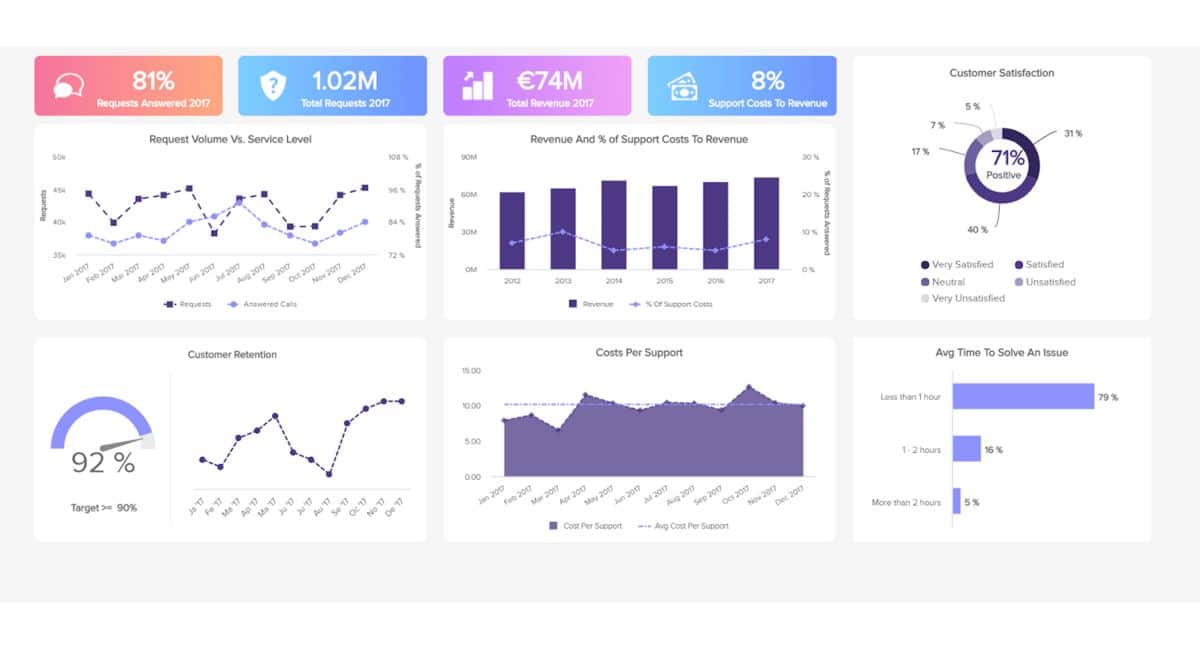
Monday.com is a highly intuitive cloud-based work management platform. It allows teams to design and track business workflows easily and features robust project management and time-tracking tools. Monday.com is ideal for companies seeking a flexible BPM solution that’s easy to use and adaptable to their needs.
Features of Monday.com:
- Resource Management & Time Tracking
- 27+ Visual Work Views
- Integration with 200+ Third-Party Apps
- Automation & AI Tools
Strengths:
- Part of a more comprehensive portfolio with CRM & Dev products
- Multiple view options (Gantt, Kanban)
- Many integration options
- Modern Interface
- Provides swift support through live chat
- Seamlessly integrate budgeting info into tasks
Weaknesses:
- Limited BPM features for complex business need
- No process flowchart library
- Task filtering tools can be a little restrictive
- Time tracking only on Pro projects plan
- The dashboard feature needs more guidance
4. Wrike BPM Tools
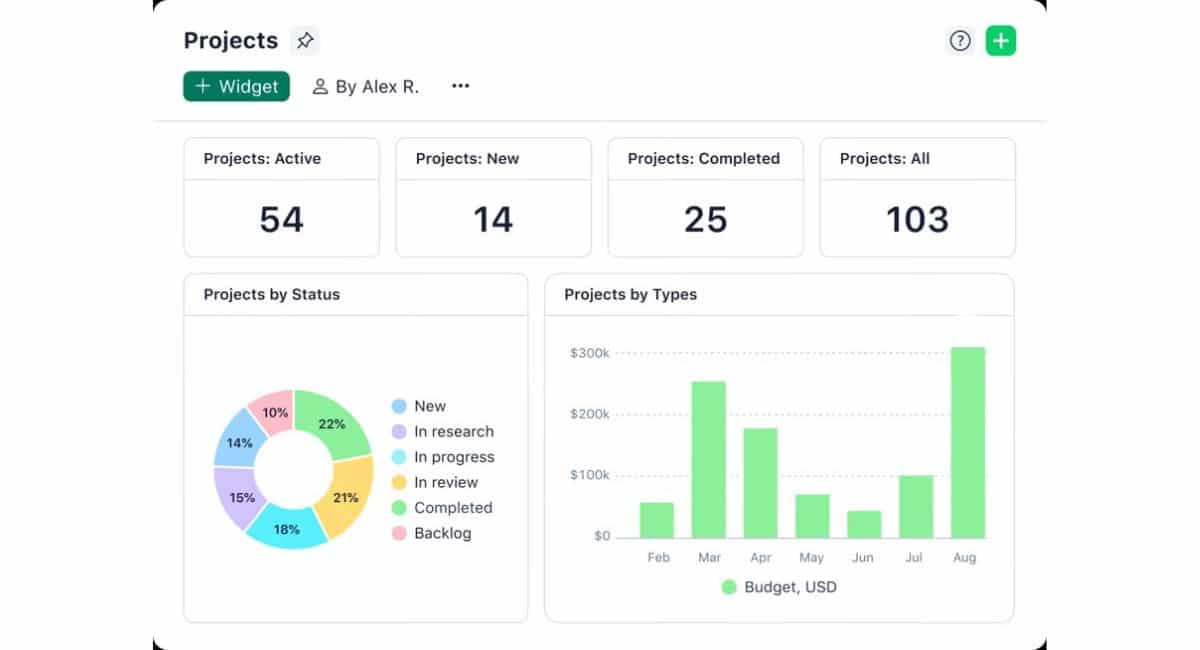
Wrike, based in the United States, provides project management software known for its collaborative features and project visibility. Their BPM solution supports project planning, execution, and reporting with real-time monitoring and automated workflows. Wrike is perfect for teams aiming to improve coordination and enhance project efficiency.
Key features of Wrike:
- Task Management
- Workflow Automation
- Resource Management & Planning
- AI Project Risk Prediction
Strengths:
- Versatile features functionality
- Collaborative Tools
- Modern, easy-to-use interface
- Can manage both projects and ongoing work
- Warnings when projects are at risk of slipping
Weaknesses:
- The initial learning curve is steep
- Customization limitations
- Limited integration with other modules
5. Kissflow BPM Tools
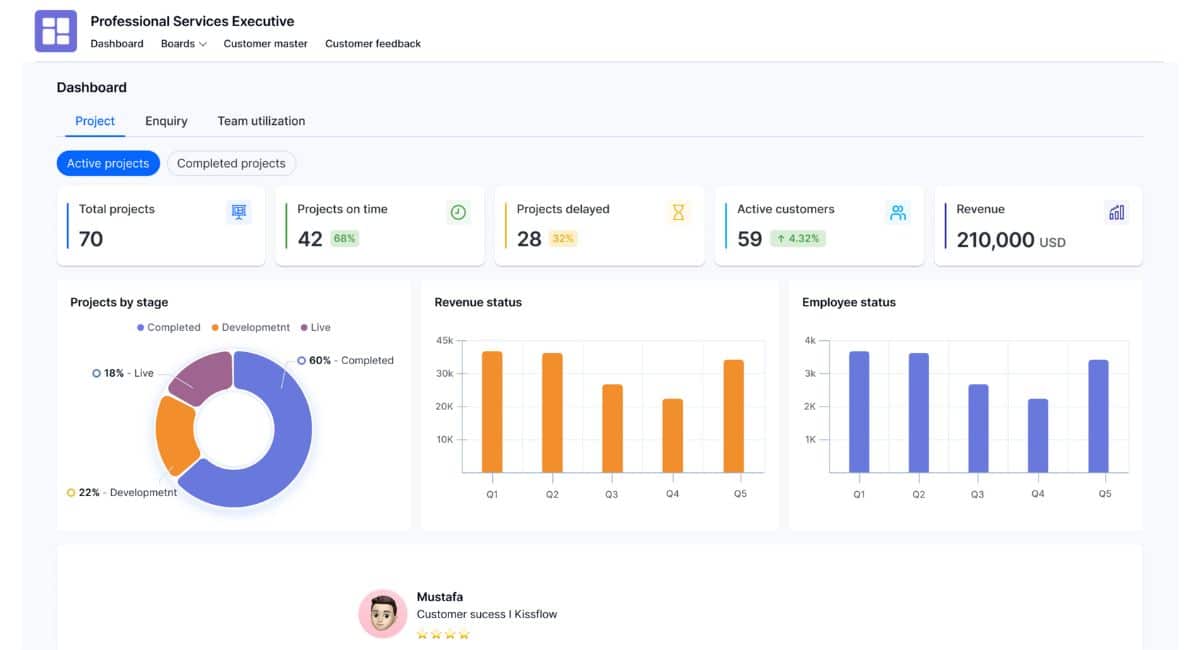
Kissflow, from India, offers a user-friendly BPM solution that’s accessible and highly adaptable. It includes tools for workflow automation, project management, and team collaboration. Kissflow helps businesses streamline their processes and boost team productivity with a solution tailored to their needs.
Features of Kissflow:
- Powerful analytics
- Agile Framework
- Governance framework
- Reporting engine
Strengths:
- Simple and intuitive interface that is easy to navigate for non-technical users
- Process modeling with no-code
- Custom components
- Custom role-based access
Weaknesses:
- Lacks some advanced BPM functionalities available in more comprehensive systems.
6. Cflow
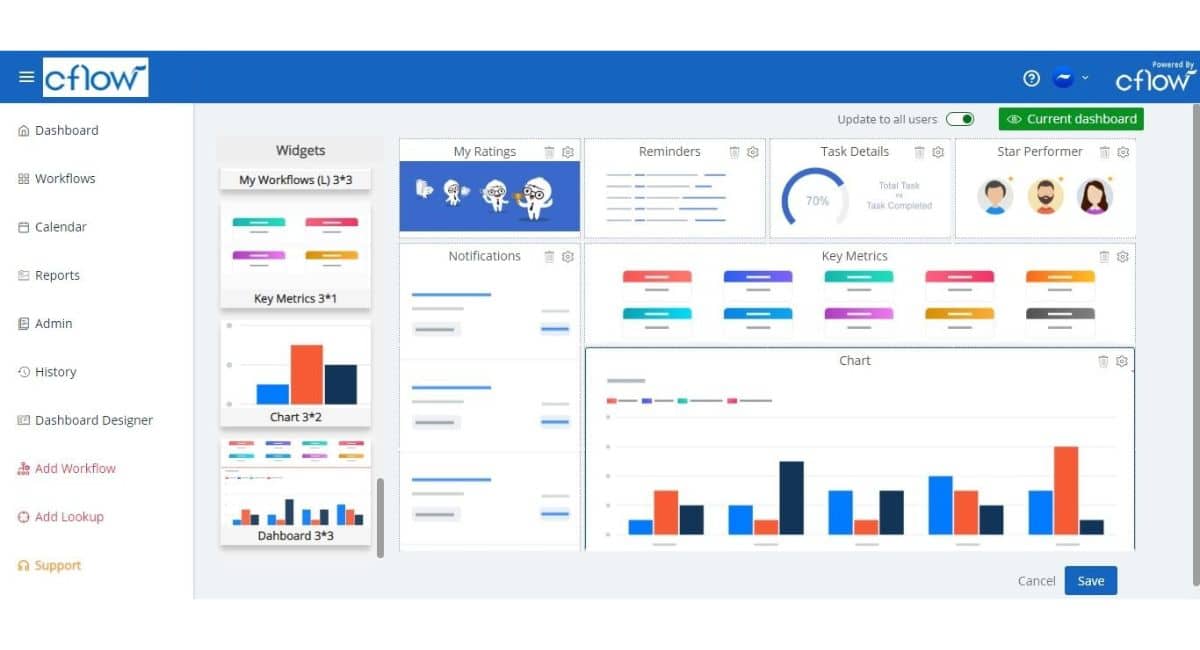
Cflow, also from India, specializes in automating workflows and managing processes with its visual workflow builder. This platform simplifies the creation and management of business workflows, featuring custom forms and status tracking. Cflow is designed to enhance process management effectiveness across various business operations.
Key features of Cflow:
- Business Process Automation
- Compliance Tracking
- Customizable Dashboard
- Customizable Reports
- Project Workflow
- Task Management
- Task Progress Tracking
Strengths:
- User-Friendly interface
- Manage, track, and approve requests via the Cflow mobile app.
- App Integration
- Reports & Analytics
Weaknesses:
- Feature limitations for business with complex needs
- Limited integrations with other business tools and platforms
7. Creatio
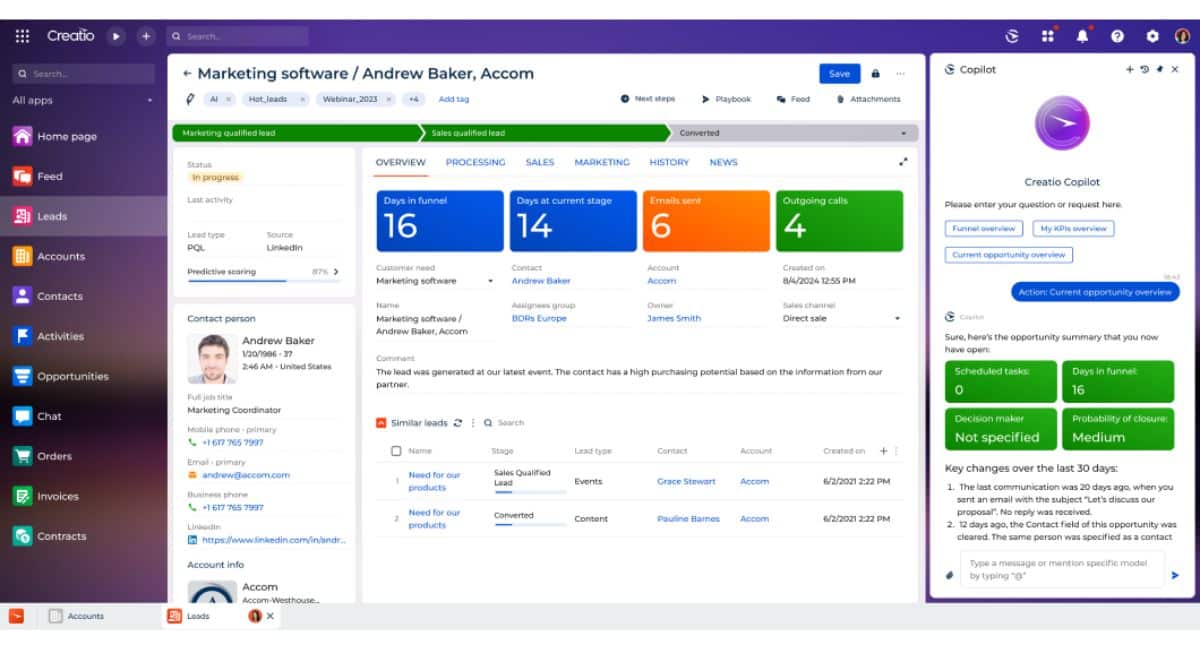
Creatio, headquartered in the United States, is known for its no-code BPM and CRM solutions. Their platform enables businesses to design and automate processes without requiring programming skills. With an intuitive process modeling tool and strong integration capabilities, Creatio is ideal for companies seeking flexible and user-friendly BPM solutions.
Critical features of Creatio:
- Process design and execution
- Process step and prediction
- Dynamics case management
- Process monitoring
Strengths:
- Highly customizable with robust BPM and CRM capabilities.
- Known for its user-friendly interface and ease of use.
- Strong workflow automation and process management tools.
Weaknesses:
- Can be complex to set up and configure, requiring dedicated resources.
- Pricing may be higher, particularly for small businesses.
8. Zoho BPM Software
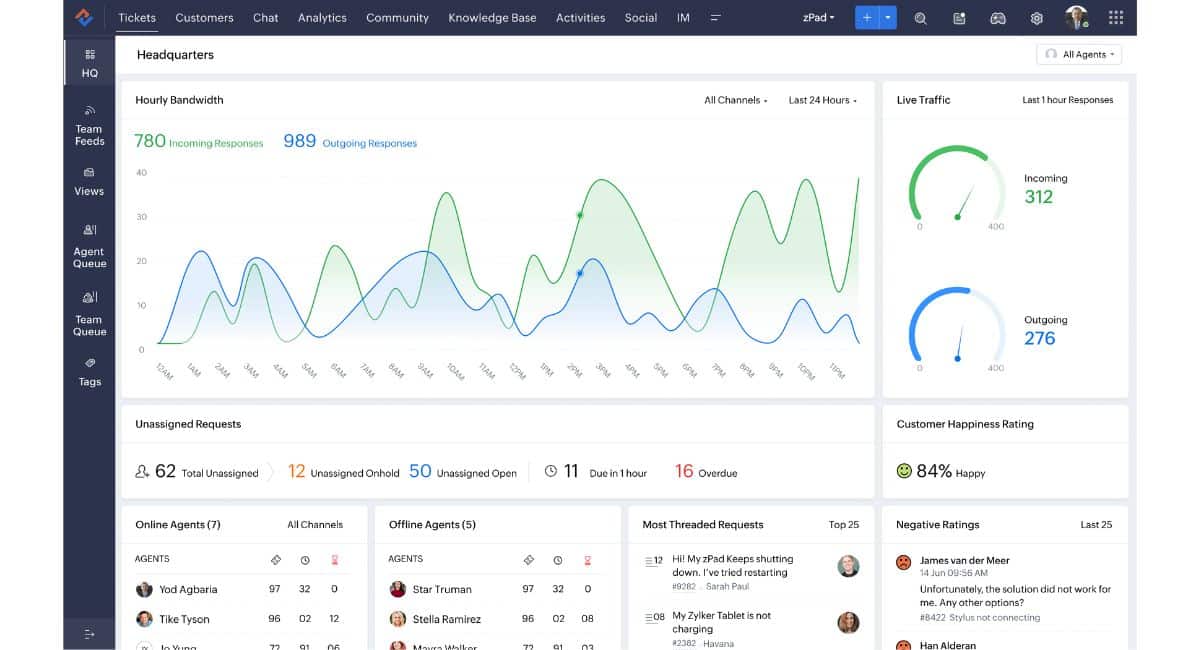
Zoho Corporation, based in India, offers a range of cloud-based business applications, including a comprehensive BPM Suite. Zoho’s solution provides tools for workflow automation, process monitoring, and team collaboration, making it an excellent choice for small to medium-sized businesses seeking cost-effective BPM solutions.
Critical features of Zoho:
- Create custom BPM apps
- Build forms your business needs
- Create automated workflows
- Define roles and permissions
- Proper approval management system
- Reporting dashboard
Strengths:
- Large feature list
- Integrates well with other Zoho applications
- Customizable capabilities
- Reliable customer support
Weaknesses:
- Steep learning curve
- Limited third-party integrations
- Has an additional cost per user
9. Appian BPM Suite
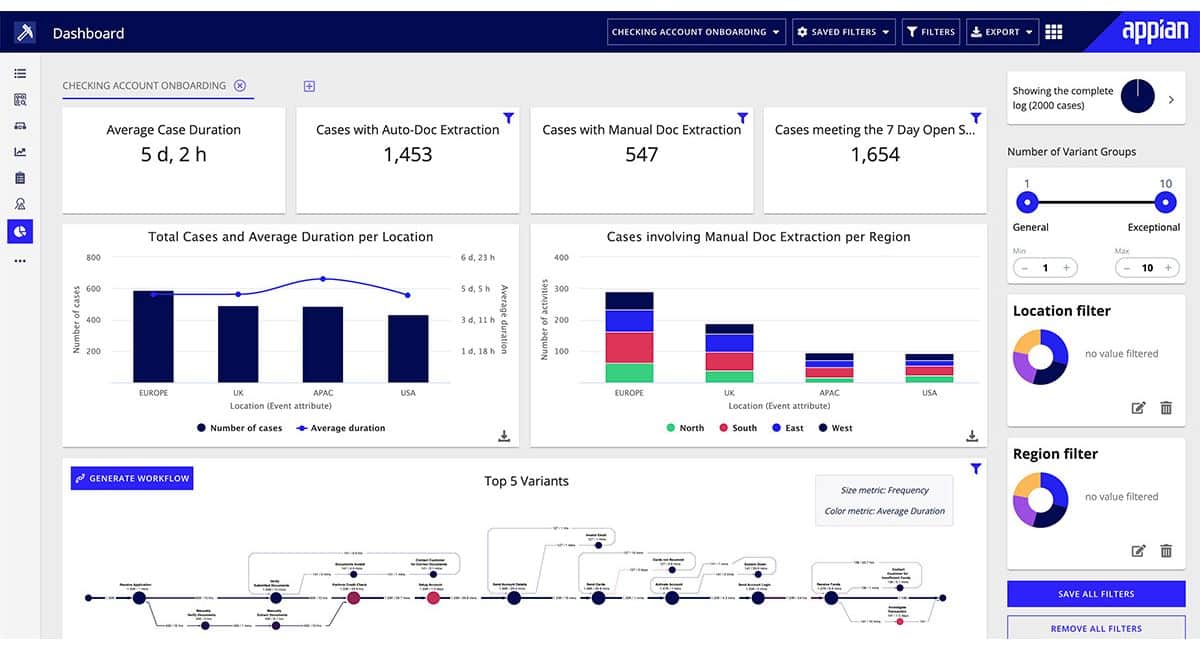
Appian, from the United States, is renowned for its fast and flexible low-code BPM Suite. This solution allows businesses to automate and modernize their processes with visual modeling and robust integration capabilities. Appian is an excellent choice for organizations needing to quickly adapt to business changes.
Features of Appian BPM Suite:
- Orchestrate end-to-end business processes
- Get support with AI-driven suggestions
- Harness complete automation
- Track process performance
Strengths:
- Comprehensive BPM features, including process automation, data integration, and analytics
- Highly customizable to fit various business processes and needs
- Integration Capabilities
Weaknesses:
- Can be expensive, making it less accessible for smaller organizations
- Initial setup and customization can be complex and time-consuming
10. Pipefy BPM Tools
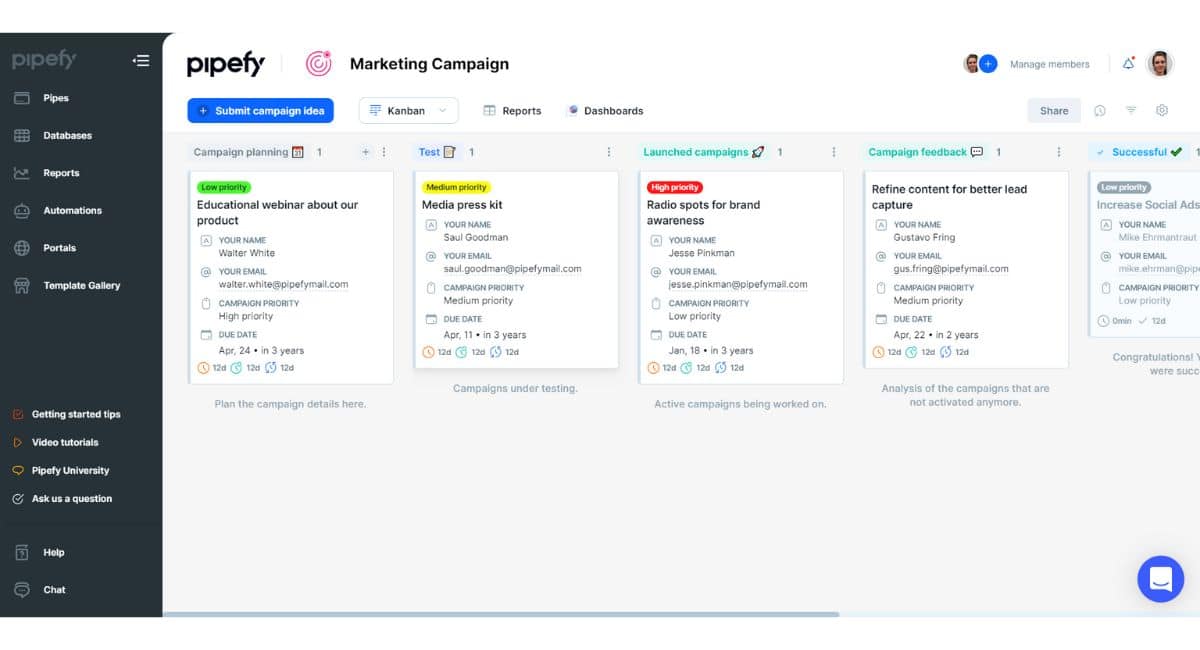
Pipefy, from Brazil, offers a BPM platform focused on workflow automation and process management. With its visual workflow creation tools and online forms, Pipefy helps businesses manage their internal processes more efficiently. The platform supports integration with third-party applications, enhancing operational efficiency.
Features of Pipefy:
- Approval Process Control
- Assignment Management
- Background Screening
- Billing & Invoicing
- Business Process Control
Strengths:
- Comprehensive and easy-to-follow user interface (UI)
- Good for approval flows
- Has a Kanban view
- Easy to create custom processes from scratch
- Has pre-built plugin templates
Weaknesses:
- Has a steep learning curve
- Can quickly become expensive
- Customization Limitations
11. IBM Business Automation Workflow
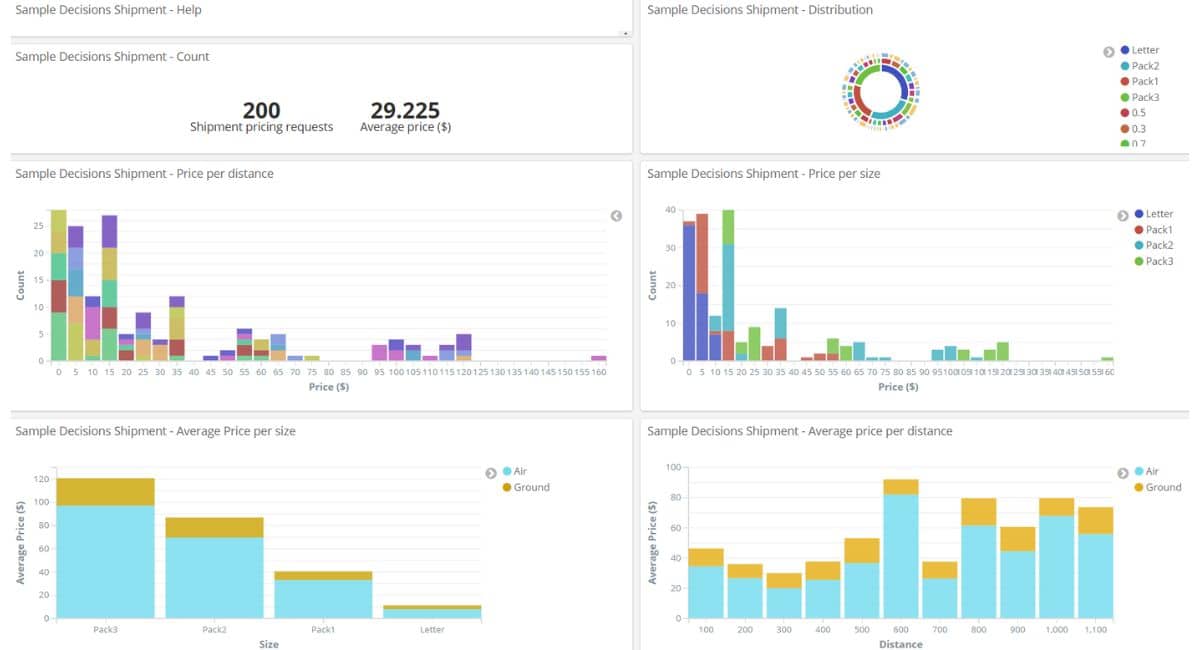
IBM Business Automation Workflow, from IBM in the United States, delivers a robust BPM solution that integrates process and case management into a unified platform. It provides advanced capabilities for designing, automating, and optimizing workflows with intelligent automation. This solution is ideal for enterprises looking to enhance efficiency and agility through sophisticated process management tools.
Key features of IBM Business Automation Workflow:
- Workflow management capabilities
- Governance and compliance capabilities
- Built-in monitoring and analytics
- Public cloud access
- Reuse of process components
Strengths:
- Offers extensive BPM and case management features with solid automation and analytics.
- Integration with IBM’s suite of products and various third-party tools.
- Well-suited for large enterprises with complex BPM requirements.
Weaknesses:
- Complex Implementation
- Higher pricing may be a barrier for smaller businesses.
12. Tallyfy
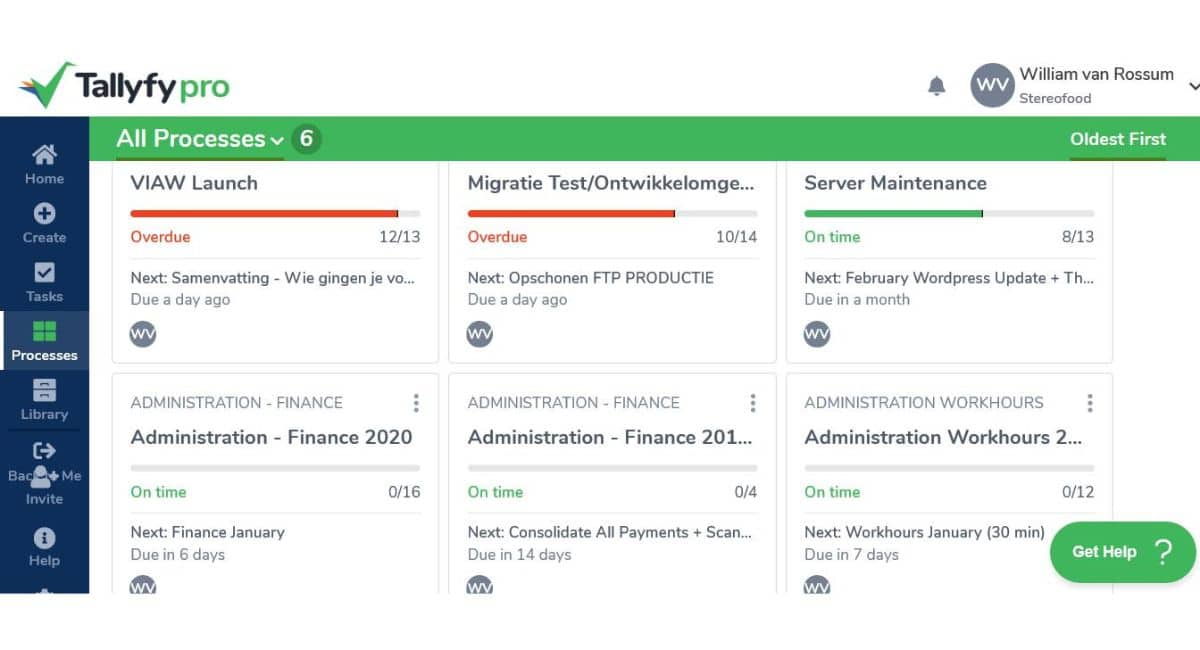
Tallyfy, based in the United States, offers a BPM platform that simplifies process management with its easy-to-use workflow tools. Tallyfy helps companies document, manage, and optimize their processes with a user-friendly interface, making it easier to improve operational efficiency and accuracy in daily operations.
Critical features of Tallyfy:
- Tasks and forms management
- Teamwork management
- Comment segment
- Structured fields
- Approve / reject management
Strengths:
- Easy-to-Navigate interface
- Easy process blueprint builder
- Extra capabilities for working with forms and documents
Weaknesses:
- Limited Features
- Integration into other systems are limited
- Minimum ten users in the basic plan
Each BPM software has unique benefits for different business needs. To find the best one, look at the user interface, automation, integration, scalability, and support. Real examples from Malaysian companies show how these solutions work well in everyday business.
How Business Process Management Software Enhances Efficiency
Using Business Process Management Software has significant benefits. It automates tasks, giving your team more time for critical work and improving workflow efficiency. A top BPM system works well with other essential business tools like ERP and CRM.
This integration creates a system that helps make data-based decisions. For instance, an ERP can show how to use resources more effectively, and a CRM can make talking to customers smoother and improve service.
Moreover, incorporating invoicing software into your BPM setup reduces errors, ensuring accurate financial management. This integration enhances cash flow management and minimizes the risk of financial mistakes, contributing to a healthier financial state for your business.
In Malaysia, businesses have experienced transformative results by adopting BPM software. They have seen improved operational efficiency and reduced manual errors, helping them stay competitive and drive market growth. The adoption of BPM technology is a strategic advantage in maintaining a leading position in today’s dynamic business landscape.
Choosing the Right Business Process Management Software
Choosing the best BPM software for your company in Malaysia is critical for achieving operational excellence. Begin by thoroughly understanding your business needs and goals to ensure the software aligns with your strategic plans and can effectively deliver the desired results.
1. Evaluate your business needs
Review the complexity of your workflows, the number of employees, and the size of your operations. This assessment will help you choose BPM tools that fit your current needs and future growth. Also, involve your team in the BPM adoption process to ensure the chosen tools meet their needs and preferences.
2. Check customization and integration capabilities
Select BPM software that can be customized to your needs and integrated with other systems like ERP or CRM. This compatibility will streamline your operations and improve overall efficiency. Identify the ‘must-have’ features essential for your business processes so that the software meets your core requirements.
3. Review Total Cost of Ownership (TCO)
Consider all related costs, including purchase, setup, training, support, and updates. Understanding the total cost helps you make an innovative, cost-effective decision that balances quality with affordability. Make a list of pros and cons to compare different BPM solutions and assess their value relative to their cost.
4. Consider user adoption
Ensure the BPM tools you choose are easy for your employees to use and accept. Providing comprehensive training and ongoing support will facilitate smooth implementation and use of the tools. Pay attention to details like usability and accessibility to enhance the user experience.
5. Evaluate vendor trustworthiness
Choose reliable BPM vendors like Appian, IBM, and Pega Systems, known for their excellent support and future updates. A dependable vendor with a solid track record can significantly impact the success and longevity of your BPM tools. Additionally, seek advice from industry experts to find the best process management system that fits your needs.
Conclusion
In 2025, companies in Malaysia must adopt the right Business Process Management (BPM) software. Effective BPM software ensures that every aspect of a business operates cohesively, improving efficiency and collaboration across departments.
Among the top BPM solutions, HashMicro’s Business Process Management Software is a comprehensive choice for Malaysian companies. It offers a robust platform to streamline business processes, optimize operations, and provide real-time insights.
With HashMicro, you can achieve greater efficiency and agility, making it an excellent investment for businesses looking to stay competitive and achieve their strategic goals. Schedule a free demo today to explore how HashMicro can transform your business.

FAQ about Business Process Management Software
-
Is BPM an ERP system?
BPM focuses on optimizing and improving business processes, while ERP integrates various business functions like finance, HR, and inventory management into a single system. Although BPM can enhance workflows within an ERP, they are distinct systems with different primary purposes.
-
What is BPM used for?
BPM (Business Process Management) is used to optimize and improve business processes. It helps organizations analyze workflows, identify inefficiencies, and implement improvements to enhance performance. BPM aims to streamline operations, reduce costs, improve customer satisfaction, and ensure regulatory compliance through better process management.
-
How does BPM software work?
BPM (Business Process Management) software works by providing tools to design, execute, monitor, and optimize business processes. Users model processes, which are then automated by the software. It monitors real-time performance, collects data, and provides insights for continuous improvement, allowing organizations to enhance efficiency and outcomes.
-
What is BPM focused on?
BPM (Business Process Management) focuses on the continuous improvement of business processes. It aims to enhance efficiency, effectiveness, and adaptability by analyzing and optimizing workflows. BPM seeks to streamline operations, reduce waste, improve quality, and ensure processes align with organizational goals and customer needs.




































